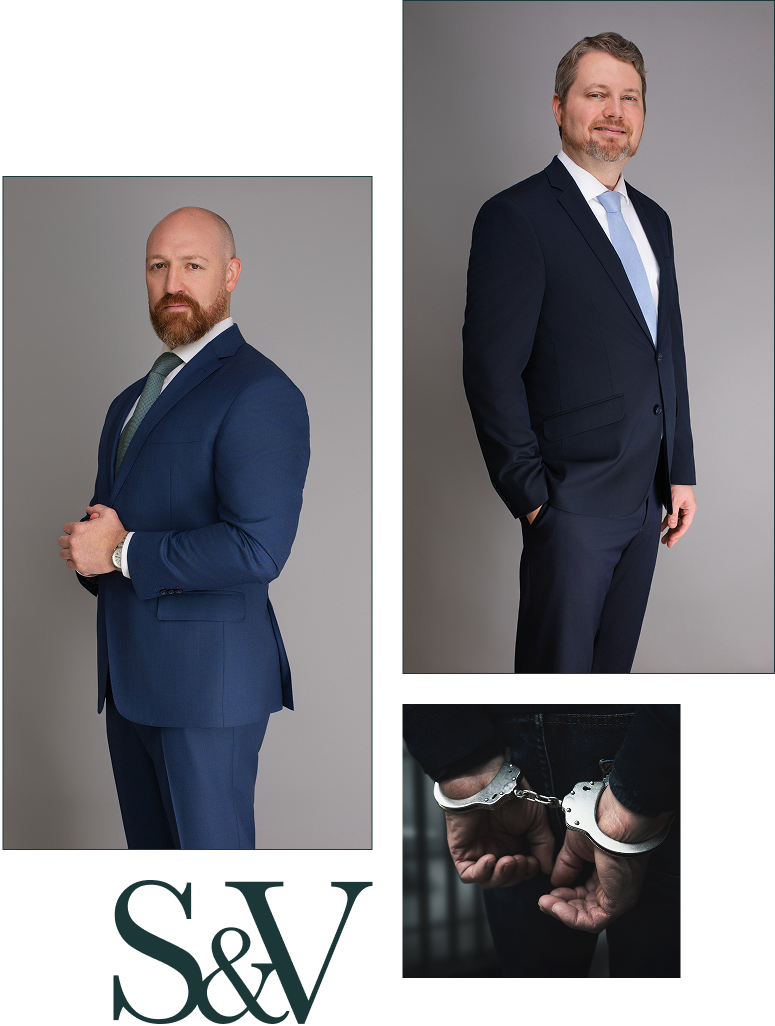
Trusted Austin Police Brutality Lawyers
When law enforcement officers violate your constitutional rights through excessive force, unlawful arrest, or other forms of misconduct, the consequences can be devastating. Police brutality doesn't just cause physical injuries — it destroys trust, traumatizes victims, and undermines the very principles of justice our society depends on.
If you've been the victim of police misconduct in Austin or Central Texas, you need attorneys who aren't afraid to take on these massive institutions and hold them accountable. The Austin police brutality lawyers at Smith & Vinson Law Firm bring decades of combined experience fighting for the rights of Texans when they need it most, and we can do the same for you. As former prosecutors, we understand how the system works from the inside, and we use that knowledge to build compelling cases against officers and departments who violate citizens' rights.
Police brutality cases require attorneys with the resources, experience, and determination to go head-to-head with well-funded government entities.
Call the Austin civil rights lawyers at Smith & Vinson Law Firm today at (512) 359-3743 to put an advocate in your corner.



What Are Your Rights During Interactions With the Police?
Understanding your constitutional rights during police encounters is the first step towards protecting yourself and building a strong case if those rights, that cannot be taken away, are violated. Every citizen has fundamental protections guaranteed by the U.S. Constitution, regardless of the circumstances of a police interaction.
- Your Fourth Amendment rights protect you from unreasonable searches and seizures. Police cannot search your person, vehicle, or property without a warrant, probable cause, or your voluntary consent. They must have reasonable suspicion of criminal activity to detain you, and that suspicion must be based on specific, articulable facts, not hunches or profiling.
- Your Fifth Amendment rights include the right to remain silent and the right against self-incrimination. You are not required to answer questions beyond providing basic identification information when legally detained. You can clearly state, "I am respectfully exercising my right to remain silent" and request an attorney.
- Your First Amendment rights protect your freedom of speech and the right to record police interactions in public spaces. You have the right to observe and document police activity as long as you don't interfere with their duties.
- Protection from excessive force is guaranteed under the Constitution. Police may only use the amount of force that is reasonable and necessary under the circumstances. The use of force must be proportional to the threat posed and the severity of the suspected crime.
- Due process rights ensure that you cannot be deprived of life, liberty, or property without proper legal procedures. This includes the right to a fair hearing, adequate notice of charges, and protection from arbitrary government action.
When police violate any of these rights, you may have grounds for a civil rights lawsuit. The Austin police brutality attorneys at Smith & Vinson Law Firm thoroughly investigate every aspect of your interaction with law enforcement to identify where constitutional violations happened and build a strong case for justice.
-
Not Guilty 2nd DWI
Our client was pulled over for a traffic violation. Officer smelled alcohol, client admitted to consuming a few drinks. Officer also noted slurred speech and bloodshot eyes. Client performed the SFST’s (roadside tests). Officer said he failed all 3, eye test, walk and turn and one-leg stand. Officer placed client under arrest and asked him for a sample of breath and/or blood. Client refused. Officer did not get a blood warrant.
-
Case Dismissed DWI
Our client, a veteran, fell asleep at the wheel and was involved in an accident. He was arrested for DWI and refused to give a breath or blood sample to the police. He came to us concerned that a DWI conviction would put an end to his military benefits. We received a plea offer for a DWI conviction with 15 months of probation, but we knew we could do better.
-
Case Dismissed DWI
Our client was charged with a DWI in Waco when he was caught crossing through a ditch to get to a frontage road during traffic. He admitted to having three drinks and performed SFSTs. However, he refused to provide breath or blood to the officers.
-
Motion to Suppress Granted During Trial DWI .11 Blood Warrant
Second jury trial (first hung 4-2 not guilty). State dismissed mid-trial after we won motion to suppress. Client asleep in driver’s seat of parked truck, engine running. Officers claimed alcohol odor from vehicle but couldn’t specify source.
-
Case Dismissed Felony DWI w/ Child Passenger
After spending Thanksgiving Day with her family, our client drove home with her daughter in the backseat of her car. She was pulled over for speeding and given a warning. At that point, she should have been free to leave. Instead, a backup officer arrived on scene and demanded that the client step out of the car so he could perform an “investigation.”
-
Case Dismissed 2nd DWI
Our client was involved in a vehicle accident in La Grange where she was ejected from the vehicle and had to stay in the hospital. There was alcohol in the car, and she had prior DWIs. The ethanol levels in her blood came back at a .13 so she was charged with Driving While Intoxicated. This client was unaware that she was charged after she left the hospital which resulted in the charge of Bail Jumping. However she maintained that she had only an 8% functioning liver due and upon researching her medical hist
-
Not Guilty DWI .17 Blood Result
A soldier on base at Fort Hood hit a parked car in the parking lot of his barracks while attempting to back into a parking space. A bystander called 911, believing the driver to be drunk. Military Police investigated the incident and performed field sobriety tests. The soldier was arrested for DWI and his blood was drawn for analysis. The lab results came back, showing an alleged blood alcohol content of 0.178.
-
Case Dismissed DWI
Our client was stopped by a police officer for driving the wrong way down a one-way street. A Blood Warrant was issued, and the test came back .09. Our client was new to the area and attempting to get a job. Pleading guilty to a DWI was not an option. After negotiating with the prosecutor, our firm was able to get the DWI charge dismissed after successful completion of 18 months deferred prosecution.
-
Pre-Trial Diversion DWI Voluntary Blood Draw
Our Client was pulled over and investigated for DWI. He was asked to perform Standard Field Sobriety Tests and subjected to an eye movement test. He also voluntarily provided a blood sample to be tested. The results were twice the legal limit.
-
Case Dismissed Intoxication Assault
Our client had allegedly been drinking with friends after work. He woke up in the hospital after an accident that severely injured another person. We fought for our client in our negotiations with the prosecutor on his felony Intoxicated Assault charge and worked with the injured party’s insurance company on a plan to compensate her for her injuries. The felony was ultimately dismissed and reduced to a misdemeanor DWI charge.
-
Case Dismissed DWI
Our client was pulled over for failure to signal intent to turn. The arresting officer claimed the vehicle accelerated at a high rate of speed (67 MPH in a 30 MPH zone) resulting in a chase. When our client stopped, the officer noted the smell of alcohol on our client’s breath.
-
Case Dismissed/Charges Reduced DWI With Child Passenger - Felony
-
Not Guilty DWI .22 Blood Warrant
This was the 2nd time we tried this case. First one ended in a mistrial last year. 911 caller reported 2 people leaving a restaurant belligerent and stumbling. Officer arrived on scene, conducted field sobriety tests and arrested client for DWI. Client refused to provide a sample. Warrant was obtained and blood came back a .22.
-
Pre-Trial Diversion DWI Voluntary Blood Draw
Our Client was pulled over and investigated for DWI. He was asked to perform Standard Field Sobriety Tests and subjected to an eye movement test. He also voluntarily provided a blood sample to be tested. The results were twice the legal limit. Our client has a prior felony conviction. The State waited a full 2 years after the incident and right before the deadline of the statute of limitations were to expire to file the charges against our Client.
-
Motion to Suppress Granted; Case Dismissed DWI 2nd .209
-
Probation (was looking at 25 to life in prison) Felony DWI
Our client was arrested and charged with DWI. The alleged BAC was 0.083. However, because he had 6 prior DWI’s and had previously been to prison multiple times, the client was facing 25 years to life in prison. The client accepted responsibility for the crime and our attorneys set this case for a sentencing hearing in front of the judge, where we put on a strong mitigation case with multiple witnesses. We were able to avoid prison or jail for the client. He was sentenced to probation.
-
Not Guilty DWI .24 Blood Warrant
Our client, an older male working professional, was stopped for a traffic violation while leaving downtown Round Rock. A major issue arose with the blood analysis conducted by a DPS analyst who had a prior disciplinary history.
-
NOT GUILTY DWI
911 caller reported our client passed out in the middle of an intersection. Police arrived on scene, and would later find meth, cocaine, and THC gummies inside the car. There were also two open containers of alcohol in the front console. Client was very groggy and unintelligible but woke up pretty quickly after officers arrived. According to the officers, the client failed the field sobriety test. But, of course, they always say this.
-
Case Dismissed; Charges Reduced Felony DWI
Our client was arrested for her fourth DWI with an alleged BAC of 0.168. The State aggressively prosecuted this case and sought prison time. We were able to work with the client on a mitigation strategy that resulted in the State agreeing to drop the felony and offer probation on a misdemeanor, keeping the client out of jail.
-
Case Dismissed DWI
Our client left 6th Street at 2:00 AM after celebrating an anniversary and fell asleep at the wheel. He was arrested for DWI at 4:30 AM and blew a .138 on the breathalyzer.
-
Not Guilty 2nd DWI
911 caller reported a major rollover, single car accident. EMS and fire arrived on scene. They had to break the window to get our client out of the car. He said he had swerved to miss a deer and had been up close to 18 hours before the crash. Police later arrived on scene, spoke to our client and he admitted to coming from a bar and drinking 2 martinis.
-
Case Dismissed DWI
Our client was stopped for a headlight that had gone out and was then arrested for and charged with DWI. He consented to a breath test and blew a .11. Upon reviewing the dash cam video, we discovered that the field sobriety tests were performed off camera. We knew that the video would not be usable in trial and used this information to pressure the prosecutor during our negotiations.



-
“I’ve worked with a few law offices over the years, but Smith and Vinson made the biggest impression. From the first time I heard and met with them, they were professional, kind, and genuinely attentive.”- Thomas A.
-
“They didn’t waste time, explained everything clearly, and were super prepared. If you need a criminal defense lawyer in Austin, this is a firm you can trust!”- Keira C.
-
“Very professional and efficient throughout my entire case. They took my situation seriously, explained every step, and made sure I felt supported. You can tell they’ve handled serious cases in Travis County before.”- Destiny E.
-
“From the first call to the last, they stayed in communication with me and let me know every step of the way. The attorneys at this office and the support staff got my case dismissed with no problems. If you find yourself in a situation, I highly recommend calling this firm.!”- Lyndsey O.
-
“From our very first consultation, Charlie took the time to truly understand my situation, explain my options clearly, and guide me every step of the way. I highly recommend him and his staff.”- Didi C.
-
“The entire staff was incredibly helpful, responsive, and made me feel supported every step of the way. I’m truly grateful for their expertise and care, they made a stressful situation so much easier to navigate.”- Cielo J. R.
-
“Brad really takes the time to get to know your situation. He was sharp, respectful, and didn’t sugarcoat anything.”- Kayla S.


Fight Back With the Police Misconduct Lawyers in Austin at Smith & Vinson Law Firm
When police violate your constitutional rights, fighting back isn't just about seeking compensation — it's about holding powerful institutions accountable and preventing future abuses. At Smith & Vinson Law Firm, we believe that every victim of police misconduct deserves justice, regardless of their background or the circumstances of their case.
Our founders, Jarrod L. Smith and Brad Vinson, are notorious trial attorneys who understand how law enforcement and government entities operate from the inside. Their experience gives them insights into police procedures, evidence gathering, and the institution that often protects officers from accountability — and helps them build cases that stand up to it.
If you've been the victim of police brutality in Austin or anywhere in Central Texas, don't let the violation of your rights go unanswered. Call Smith & Vinson today at (512) 359-3743 or contact us online to start fighting back.













.png.2508141209202.webp)


